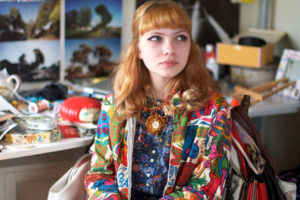Possibly the most impressive TED talk I’ve seen in a while was by Tavi Gevinson, who was only 15 at the time. She started making a name for herself at the age of 11 with her blog Style Rookie in which she posted pictures of herself wearing various outfits and commenting on the latest trends–and this ‘hobby’ soon attracted nearly 30,000 views per day. So I was feeling sufficiently unaccomplished before she had even really begun her talk. By the end of it, I was feeling a mixture of insane jealousy, awe and respect at the wisdom pouring out of her mouth despite her young age. At the time she had moved away from fashion and had turned her attention toward pop culture and feminist discussion–the question around which her discussion centred was ‘what makes for a strong female character?’
By now we’ve all been made aware of how girls in films, TV shows and books are somewhat lacking in depth: often they serve no purpose other than to provide the male lead with a sexual interest and their most defining characteristic is simply being attractive. Even the women who are supposedly ‘strong’ or ‘independent’ just adhere to another stereotype; rather than providing viewers with a relatable character, we’re given yet another perfected image of a ‘powerful woman’ without leaving any space to be really human. Often it just seems as if some characters are there simply to prove that the show/film/book is tackling the necessity of having strong female roles while forgetting to make them likable or even realistic. Perhaps it would be better to not have ‘strong female characters’ but rather, just strong characters–the very necessity to categorise them according to gender points to the fact that it is still somewhat unequal.
Granted, we are starting to see a shift away into more flawed and realistic female leads in shows such as Girls and Broad City–where the characters are as messy and clueless as the rest of us–however Gevinson points out that there still aren’t many portrayals of these kinds of figures for teenage girls. She also started digging into the psychological effects of this, and what she said made a lot of sense. If from a young age we’re shown women with clear-cut and understandable emotions, then we grow to expect ourselves to be as straight-forward as these women. Even female characters who are ‘conflicted’ or ‘unpredictable’ inevitably fall into a set category, and pop culture is only just beginning to scratch the surface of the full complexity of human emotion. The reality that we’re all ultimately a bundle of contradictions and insecurities and all at an equal loss as to the best course to take in life comes as something of a shock if we’re consistently given a formulaic version of ourselves.
What we need‚Äìwhat young girls need‚Äìis to know that feeling these things doesn‚Äôt mean you‚Äôre doing things wrong. There is a tangible pressure to be a ‚Äòsuccess’‚Äìand indeed there is a set formula for how to achieve this‚Äìto have the right friends, date the right people, look the right way etc. etc., and we punish ourselves when we can‚Äôt understand the complexities of our minds rather than accept it as a fact of being human.
I honestly couldn’t believe the wisdom of the things Gevinson was saying considering the fact she was only in her teens–when I was her age I was so wrapped up in my school, the cliques, ‘fitting in’ and I never once really thought to question it. Not only did Gevinson realise these things (that some people in their adult life still haven’t grasped) she also set up a website (Rookie Magazine) that spread these ideas. It was envisioned as a space for girls to read or submit anything they wanted; beauty tips posted alongside feminist or political discussions and movie reviews. She stresses that the point of her site is not to claim to have the answers to the insecurities and problems that face girls, but simply to provide a space in which they can realise that they have the potential to find the answers themselves, and that it’s okay to be confused, to be contradictory even to yourself, to not understand quite what’s going on. She opens up feminism as a platform for discussion rather than a rule book; there’s no right way to do things, but it makes it an awful lot easier if it’s talked about. It’s also an opportunity for girls to simply flourish and explore, to pursue their interests in fashion and feminism, in cooking and sports, with no inhibitions that these things are mutually exclusive.
In 2014 Gevinson was named one of the “25 Most Influential Teens of 2014” by Time Magazine, and I for one am glad that she inspires such influence, because if everyone listened to half of the ideas she‚Äôs promoting we would all be a lot happier, and a lot more comfortable with our own imperfections.
-Scarlett Evans
Junior Girl
Girl Museum Inc.

